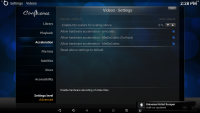Table of Contents
Release Note of Android Marshmallow (v1.4)
Summary
| Release Date | Jan/19/2017 KST |
| Release Type | Regular release |
| Release Files | Self-installation Image (MD5SUM: 3bcb87ec5d3be88c49a66538ac3dff26) |
File name : selfinstall-odroidc2-eng-s905_6.0.1_master-20-v1.4.img
New updates
- Android-6.0.1_r22 HMC19J base.
- Fixed USB DAC audio noise issue.http://forum.odroid.com/viewtopic.php?f=141&t=25434
- Fixed disappearing volume/power/screenshot icons problem when HDMI is in low-resolution mode.Forum Thread
- RTC Shield driver is enabled by default. If you want to use i2c driver, edit boot.ini like below.
For GPIO/I2C mode.
#movi read boot 0 ${loadaddr}
fatload mmc 0:1 ${loadaddr} Image
For RTC Shield driver.
movi read boot 0 ${loadaddr}
#fatload mmc 0:1 ${loadaddr} Image
- Added an example to launch apps via GPIO keys.https://codewalkerster.blogspot.kr/2017/01/how-to-use-gpio-key-in-odroid-c2android.html
- Fixed the shifted touch area issue on overlay button. http://forum.odroid.com/viewtopic.php?f=137&t=25314
- Improved USB device detection time. http://forum.odroid.com/viewtopic.php?f=139&t=25079&p=173700#p173356
- Added a few requested USB-Multitouch VID/PID. http://forum.odroid.com/viewtopic.php?f=51&t=15495
/* Planar PS5561T HDMI capacitive Screen */ #define USB_VENDOR_ID_PLANAR 0x1EF1 #define USB_DEVICE_ID_PLANAR_PS5561T_TOUCH 0x0001
Kodi settings
- Kodi 16 is crashing at the end of every video. Uncheck 'Allow hardware acceleration - amcodec' option to solve this issue.
- Kodi 17 RC3 has no that issue. It always uses the MediaCodec HW acceleration.
Self Installation
You can install the release to your MicroSD or eMMC with the tool dd in Linux or Win32DiskImager in Windows. Please refer this for more detail.
We've reported that some of users can not watch Android logo on their TV while installing even though installation is proceeded. So please wait for 5~10 minutes since power on and red and blue LED is on. If blue led is started blinking then installation is proceeding, ODROID-C2 will reboot when finished.
Upgrade Installation
This Marshmallow release doesn't support the update/upgrade from Lollipop.
You must install the self-installation image.
How to get the full source code
Full source code will be released in the middle of December after fixing some critical issues and source code clean up.
Reference boot.ini
- boot.ini
ODROIDC2-UBOOT-CONFIG setenv dtbaddr 0x1000000 setenv loadaddr 0x20000000 # Resolution Configuration # 'hdmimode' must be one of below to configure display resolution within # supported by your TV or monitor. # Symbol | Resolution # ----------------------+------------- # "480p60hz" | 720x480 Progressive 60Hz # "576p50hz" | 720x576 Progressive 50Hz # "720p60hz" | 1280x720 Progressive 60Hz # "720p50hz" | 1280x720 Progressive 50Hz # "1080p60hz" | 1920x1080 Progressive 60Hz # "1080p50hz" | 1920x1080 Progressive 50Hz # "1080p30hz" | 1920x1080 Progressive 30Hz # "1080p24hz" | 1920x1080 Progressive 24Hz # "1080i60hz" | 1920x1080 Interlaced 60Hz # "1080i50hz" | 1920x1080 Interlaced 50Hz # "2160p60hz" | 3840x2160 Progressive 60Hz # "2160p50hz" | 3840x2160 Progressive 50Hz # "2160p30hz" | 3840x2160 Progressive 30Hz # "2160p25hz" | 3840x2160 Progressive 25Hz # "2160p24hz" | 3840x2160 Progressive 24Hz # "2160p60hz420" | 3840x2160 Progressive 60Hz YCbCr 4:2:0 # "2160p50hz420" | 3840x2160 Progressive 50Hz YCbCr 4:2:0 # "640x480p60hz" | 640x480 Progressive 60Hz # "800x480p60hz" | 800x480 Progressive 60Hz # "800x600p60hz" | 800x600 Progressive 60Hz # "1024x600p60hz" | 1024x600 Progressive 60Hz # "1024x768p60hz" | 1024x768 Progressive 60Hz # "1280x800p60hz" | 1280x800 Progressive 60Hz # "1280x1024p60hz" | 1280x1024 Progressive 60Hz # "1360x768p60hz" | 1360x768 Progressive 60Hz # "1440x900p60hz" | 1440x900 Progressive 60Hz # "1600x900p60hz" | 1600x900 Progressive 60Hz # "1600x1200p60hz" | 1600x1200 Progressive 60Hz # "1680x1050p60hz" | 1680x1050 Progressive 60Hz # "1920x1200p60hz" | 1920x1200 Progressive 60Hz # "2560x1080p60hz" | 2560x1080 Progressive 60Hz # "2560x1440p60hz" | 2560x1440 Progressive 60Hz # "2560x1600p60hz" | 2560x1600 Progressive 60Hz # "3440x1440p60hz" | 3440x1440 Progressive 60Hz setenv hdmimode "1080p60hz" setenv rootopt "root=/dev/mmcblk0p2 rw init=/init rootwait" setenv consoleopt "console=ttyS0,115200" setenv androidopt "androidboot.hardware=odroidc2 androidboot.serialno=${fbt_id#}" setenv logoopt "osd1,loaded,${fb_addr},${hdmimode}" setenv selinuxopt "androidboot.selinux=disabled" # HDMI/DVI Mode Configuration # This will enforce the signal type of display # "hdmi" - For HDMI interface # "dvi" - For DVI interface setenv vout_mode "hdmi" # HPD enable/disable option setenv disablehpd "false" # Overscan offset configuration # All offsets are zero and can be tuned by manual or ODROID Utility setenv overscan_top "0" setenv overscan_left "0" setenv overscan_bottom "0" setenv overscan_right "0" setenv led_onoff "on" suspend_hdmiphy=0 # max cpu frequency in dvfs table / in MHz unit # setenv max_freq "2016" # 2.016GHz # setenv max_freq "1944" # 1.944GHz # setenv max_freq "1920" # 1.920GHz # setenv max_freq "1896" # 1.896GHz # setenv max_freq "1752" # 1.752GHz # setenv max_freq "1680" # 1.680GHz # setenv max_freq "1656" # 1.656GHz # setenv max_freq "1536" # 1.536GHz setenv max_freq "1536" # max cpu-cores # setenv maxcpus "1" # setenv maxcpus "2" # setenv maxcpus "3" setenv maxcpus "4" # disable vu7 setenv disable_vu7 "false" setenv bootargs "${rootopt} ${consoleopt} hdmimode=${hdmimode} hdmitx=${cecconfig} vout=${vout_mode} disablehpd=${disablehpd} logo=${logoopt} ${androidopt} ${selinuxopt} suspend_hdmiphy=${suspend_hdmiphy} led_onoff=${led_onoff} max_freq=${max_freq} maxcpus=${maxcpus} disable_vu7=${disable_vu7}" save showlogo ${hdmimode} #usb pwren movi read dtb 0 ${dtbaddr} # load kernel from vat or boot partition. movi read boot 0 ${loadaddr} #fatload mmc 0:1 ${loadaddr} Image booti ${loadaddr} - ${dtbaddr}
